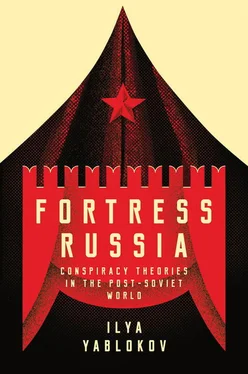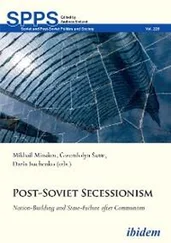Radnitz, S. (2016). Paranoia with a purpose: conspiracy theory and political coalitions in Kyrgyzstan. Post-Soviet Affairs , 32 (5): 474–89.
Razuvalova, A. (2015). Konspirologicheskii siuzhet v fil’me ‘Lermontov’ i ‘Dnevnike rezhissera’ N. Burliaeva: k voprosu ob ‘etnografii emotsii’ natsional’no-konservativnogo obshchestva. Antropologicheskii forum , (25): 95–121.
Remnick, D. (1998). Resurrection: The Struggle for a New Russia . New York: Vintage Books.
Rhodes, E. (1997). Origins of a Tragedy: Joseph Stalin’s Cycle of Abuse. The Journal of Psychohistory , 24 (4): 377–89.
Riabov, P. (2010). Mikhail Katkov ili Ideologiia Okhranki: po povodu odnogo sbornika statei. Forum noveishei vostochnoevropeiskoi istorii i kul’tury , (2): 35–68.
Rights in Russia. (2012). Ludmila Alekseeva answers Arkady Mamontov . [online] Available at: http://hro.rightsinrussia.info/archive/ngos/mamontov/alekseeva.
Risen, J. (2015). Joe Biden, His Son and the Case against a Ukrainian Oligarch . [online] New York Times. Available at: https://www.nytimes.com/2015/12/09/world/europe/corruption-ukraine-joe-biden-son-hunter-biden-ties.html.
Rittersporn, G. T. (2014). Anguish, Anger, and Folkways in Soviet Russia. Pittsburgh: University of Pittsburgh Press.
Robins, R. S. and Post, J. M. (1987). The Paranoid Political Actor. Biography , 10 (1): 1–19.
—— (1997). Political Paranoia: The Psychopolitics of Hatred. New Haven and London: Yale University Press.
Rogin, M. P. (1987). Ronald Reagan, The Movie and Other Episodes in Political Demonology. Berkeley: University of California Press.
Rogov, K. (2013). Sverkhbol’shinstvo dlia sverkhprezidentstva. Pro et Contra, 17, (3–4): 102–25.
—— (2015). ‘Krymskii sindrom’: mekhanizmy avtoritarnoi mobilizatsii. Kontrapunkt , (1): 1–15.
Ross, C. (2009). Local Politics and Democratization in Russia . London: Routledge.
—— ed. (2016). Systemic and Non-Systemic Opposition in the Russian Federation. Civil Society Awakens? London: Routledge.
Rossman, V. (2002). Russian Intellectual Antisemitism in the Post-Communist Era. Lincoln: The University of Nebraska Press.
Rozhdestvenskii, I., Mikhailova, A., Rustamova, F., Glikin, M. and Makarenko, G. (2016). Armiia Zolotova: zachem i kakim obrazom sozdaetsia natsional’naia gvardiia . [online] RBC. Available at: http://www.rbc.ru/politics/05/04/2016/5703ed1d9a794798356bbca1.
Sakva, N. (no date). Chto takoe ‘plan Dallesa? ’ [online]. Available at: http://sakva.ru/Nick/DullPlan.html.
Sakwa, R. (2005). The 2003–2004 Russian Elections and Prospects for Democracy. Europe-Asia Studies , 57 (3): 369–98.
—— (2009). The Quality of Freedom: Khodorkovsky, Putin, and the Yukos Affair. Oxford: Oxford University Press.
—— (2011). Surkov: Dark Prince of the Kremlin [online] Open Democracy Russia . Available at: https://www.opendemocracy.net/od-russia/richard-sakwa/surkov-dark-prince-of-kremlin.
—— (2012). Conspiracy Narratives as a Mode of Engagement in International Politics: The Case of the 2008 Russo-Georgian War. Russian Review, 71(4): 581–609.
—— (2014). Putin and the Oligarch: The Khodorkovsky-Yukos Affair . London: I. B. Tauris.
Samarina, A. (2004). Moskovskie degustatory ukrainskogo sala. [online] Nezavisimaia gazeta. Available at: http://www.ng.ru/ideas/2004-12-07/1_pavlovskiy.html.
Samoilenko, S. A. and Erzikova, E. (2017). Media, political advertising and election campaigning in Russia. In C. Holtz-Bacha and M. Just, eds., Handbook of Political Advertising . Routledge, London, pp. 253–68.
Saradzhyan, S. and Schreck C. (2005). NGOs a Cover for Spying in Russia . [online] Global Research. Available at: http://www.globalresearch.ca/ngos-a-cover-for-spying-in-russia/139.
Schimmelpenninck Van Der Oye, D. (2001). Toward the rising sun: Russian ideologies of empire and the path to war with Japan . DeKalb, IL: Northern Illinois University Press.
Schimpfossl, E. and Yablokov, I. (2014). Coercion or Conformism? Censorship and Self-Censorship among Russian Media Personalities and Reporters in the 2010s. Demokratizatsiya: The Journal of Post-Soviet Democratization, 22(2): 295–312.
Schmidt, D. (2006 ). Russia’s NGO Legislation: New (and Old) Developments . [online] Russian Analytical Digest. Available at: https://www.files.ethz.ch/isn/19048/Russian_Analytical_Digest_3.pdf.
Schmidt, M. L., Mazzetti, M. and Apuzzo, M. (2017). Trump Campaign Aides Had Repeated Contacts With Russian Intelligence. [online] New York Times. Available at: https://www.nytimes.com/2017/02/14/us/politics/russia-intelligence-communications-trump.html.
Sedakov, P., Vernidub, A. and Guseva, D. (2007). Kul’tiverovanie. Russkii Newsweek , (41): 32–5.
Shcherbal’, M. (2010). Ekonomicheskaia situatsiia v strane i lichnoe material’noe polozhenie glazami rossiian: dinamika otsenok naseleniia (2005–2010). Monitoring obshchestvennogo mneniia (5): 252–64.
Sheiko, K. and Brown, S. (2014). History as Therapy: Alternative History and Nationalist Imaginings in Russia . Stuttgart: Ibidem Press.
Shekhovtsov, A. (2015). Western Sources of Neo-Eurasianism: Recent Findings on Alexander Dugin and the European New Right, 1989–1994. In M. Laruelle, ed. Eurasianism and the European Far Right: Reshaping the Europe–Russia Relationship . Lanham: Lexington Books, pp. 35–53.
—— (2018). Russia and the Western Far Right. London: Routledge.
Shenfield, S. D. (2001). Russian Fascism: Traditions, Tendencies, Movements. Armonk: M. E. Sharpe.
Sherlock, T. (2011). Confronting the Stalinist Past: The Politics of Memory in Russia. The Washington Quarterly , 34(2): 93–109.
Shevel, O. (2011). Russian Nation-building from Yel’tsin to Medvedev: Ethnic, Civic or Purposefully Ambiguous? Europe-Asia Studies, 63(2): 179–202.
Shevtsova, L. (1999). El’tsin’s Russia: Myths and Reality. Washington, DC: Carnegie Endowment for International Peace.
—— (2005). Putin’s Russia. Washington, DC: Carnegie Endowment for International Peace.
—— (2015). Forward to the Past in Russia. Jouranl of Democracy , 26(2): 22–37.
Shnirel’man, V. (2002). The Myth of the Khazars and Intellectual Antisemitism in Russia, 1970s–1990s. Jerusalem: The Hebrew University of Jerusalem.
—— (2006). Byt’ alanami. Intellektualy i politika na Severnom Kavkaze v XX veke. Moscow: Novoe literaturnoe obozrenie.
—— (2012). Khazarskii mif: ideologiia politicheskogo radikalizma v Rossii i eë istoki. Moscow: Mosty kultury.
—— (2017). Koleno Danovo. Eskhatologiia i antisemitizm v sovremennoi Rossii. Moscow: Izdatel’stvo BBI.
Sidorenko, A. (2011). Russia: Creators of Election Violation Map Come Under Attack. [online] Global Voices. Available at: https://globalvoices.org/2011/11/30/russia-creators-of-election-violation-map-come-under-attack/.
Sigelman, L. and Shiraev, E. (2002). The Rational Attacker in Russia? Negative Campaigning in Russian Presidential Elections. The Journal of Politics , 64(1): 45–62.
Smirnov, S. (2012). Medvedev: ‘V slove “agent” net nichego plokhogo’. [online] Vedomosti. Available at: http://www.vedomosti.ru/politics/news/6930971/medvedev_v_slove_agent_net_nichego_plohogo#ixzz2EMGZkLnk.
Smith, D. (1999). Working the Rough Stone: Freemasonry and Society in Eighteenth Century Russia . De Kalb: Northern Illinois University Press.
Читать дальше
Конец ознакомительного отрывка
Купить книгу












